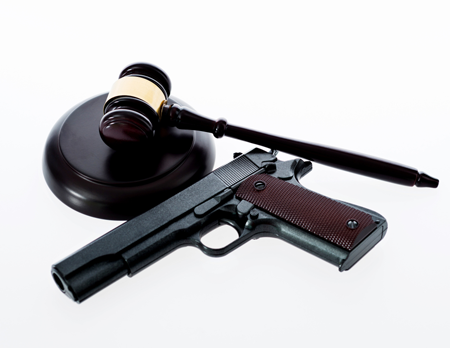Judge is removed from the bench for false statements about firing gun, retaliation

Image from Shutterstock.com.
An Illinois judge has been removed from the bench based on accusations that he lied about accidentally firing a gun in his apartment and retaliated against two court employees who complained about sexual harassment.
The Illinois Courts Commission removed Judge Patrick J. O’Shea from the DuPage County bench in a Sept. 27 order. The removal was effective Oct. 1.
The Daily Herald, the Chicago Sun-Times, Injustice Watch, Law360 and Bloomberg Law have stories.
The commission said O’Shea initially lied to detectives investigating the gun discharge and also made untruthful statements to the Illinois Judicial Inquiry Board, which conducted the initial investigation. “Giving false testimony under oath is an assault to our legal system,” the commission said in its order.
Besides that, O’Shea “provided unbelievable testimony” at a hearing by the commission, the order said.
The commission made these findings regarding the incidents:
• The gun incident. O’Shea had initially made false and misleading statements to detectives who investigated after O’Shea’s neighbors reported finding a bullet in their apartment in 2017. Detectives said O’Shea told them that the holes in his wall were caused by a screwdriver and nail gun. When the detectives informed O’Shea that a bullet had been found in the neighboring apartment, O’Shea told them that his son must have fired the gun, the detectives said. After further questioning, O’Shea admitted accidentally firing the gun.
O’Shea testified in an initial ethics hearing before the Judicial Inquiry Board that he immediately told detectives that he discharged the firearm. At a second hearing before the Illinois Courts Commission, O’Shea said he did tell detectives that the hole was from a screwdriver, but he wasn’t untruthful because he had used a screwdriver to make the hole bigger.
The commission said O’Shea’s testimony was “inconsistent and untruthful.”
• A clerk’s complaint and O’Shea’s response. A clerk assigned to O’Shea’s courtroom in August 2017 said he had made her uncomfortable. In one instance, he asked her to bring something up on her computer, and then “he leaned over her shoulder a little too closely.” In another instance, she testified, O’Shea told her that if she worked for him, he would “let her do whatever she wanted.” Another time, she came in late after taking her daughter to school. According to the clerk, O’Shea said, “You wore that to drop your daughter of at school?” Then he allegedly said, “You should wear that every day.”
The clerk asked her supervisor to remove her from O’Shea’s courtroom. After her removal, O’Shea filed a complaint alleging poor performance by the clerk. The purpose of the complaint was retaliation, the commission concluded. Evidence showed that the clerk had worked in the courthouse for many years, and no one else had complained about her work. O’Shea had testified that the complaint was not retaliatory, but the testimony was untruthful and unbelievable, the commission said.
• Unwelcome comments to a judicial assistant and judge. A judicial assistant to another judge testified that O’Shea would walk past her desk when she was on her computer and ask whether she was buying lingerie. In another incident, in May 2016, O’Shea asked whether the assistant and judge were in the judge’s chambers “hugging and kissing,” according to the assistant. He passed by again and allegedly said, “Yeah, you guys are always in there with the door closed, the lights off, hugging and kissing.” The next day, the assistant said, O’Shea saw her and said, “I have my lights dimmed for you, just how you like them.” The judge who worked with the assistant confirmed that O’Shea had made hugging and kissing comments.
The judicial assistant filed a complaint. After that, she said, O’Shea would not speak to her and would not let her in his chambers. In July 2016, the assistant tried to walk into O’Shea’s chambers to deliver a pretrial memo. The judge screamed at her to wait and shut the door in her face, she said. She acknowledged that she did raise her voice but said she did not yell. O’Shea complained to the judicial assistant’s supervisor about the incident and also said he was concerned that her tattoos “were gang related.”
The judicial assistant was given a verbal reprimand, in hopes that would satisfy O’Shea, a supervisor testified.
O’Shea denied making comments about the judge and assistant dating or kissing and hugging. Instead, he said he warned the judge and assistant that people would talk if they were in chambers together with the lights dimmed and the door closed. He also acknowledged making comments to the assistant about searching for lingerie on her computer but only because he wanted her to know that people could see what she was doing.
The commission found that O’Shea’s hostile conduct against the assistant was retaliatory.
The commission concluded that O’Shea used his position of power as a judge to file complaints against the employees. He “exploited his position to satisfy his personal concerns and misplaced personal grievance,” the commission said.
The commission also expressed concern that O’Shea “has not acknowledged any real wrongdoing” regarding any of the allegations. O’Shea “disputed the actual allegations and still maintains that the allegations were untrue,” the commission said. He “never suggested that he may have been untruthful or even the slightest bit misleading or deceptive at any time.”
O’Shea was elected in 2012 and retained in last November’s general election, even though the ethics allegations were pending against him.
Write a letter to the editor, share a story tip or update, or report an error.


